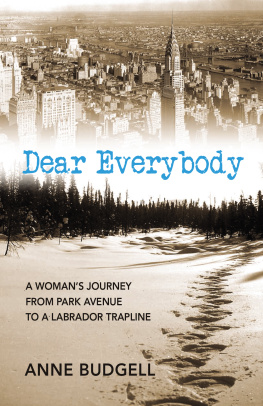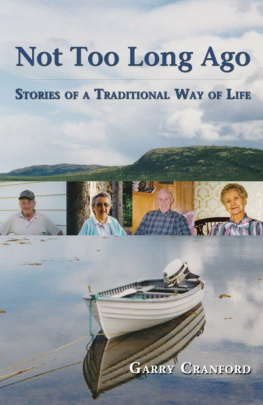Table of Contents
PREFACE
ILLUSTRATIONS
PREFACE
Table of Contents
Where can I find that story of the Copper Store? was asked me one day.
You cant get it; its out of print.
Well, why not reprint it?
Im sure I dont know.
Conference with the publishers revealed that they did not know either.
The latest science teaches us that Nature conserves everything; not only matter, but energy. A number of new stories which had been graded as worth telling needed a medium for materialization. Man is nothing if not imitative. There seemed no valid reason why we should not copy mans great teacher in conservation and, like history, repeat anything that might be of interest or value. Hence, this book, Northern Neighbors , has become the required vehicle to meet the wishes of many friends of Labrador and its fisherfolk.
Not only The Copper Store, but Off the Rocks, That Bit o Line, Little Prince Pomiuk, Reported Lost, Johnny, Peter Wright, Mail-Carrier, and Green Pastures are reprinted from the volume entitled Off the Rocks , first published in 1906.
W. T. G.
July, 1923.
ILLUSTRATIONS
Table of Contents
OFF THE ROCKS
Table of Contents
It was Saturday night in the early fall when in our hospital schooner we anchored among Adlavik Islands. A number of vessels were there making the fish, which they had caught farther north. Many of them had called to pick up their freighters, or poorer folk, who had to come down to the Labrador fishery for a living, and yet had been too poor to get credit to purchase a schooner of their own. They had therefore taken passage on some already crowded craft, in return paying twenty-five cents to the master for every quintal or hundredweight of fish they should catch during the summer.
Among these, lying close beside us at anchor, was a small vessel, labeled on the bow the Firefly, though if ever in her early days she had possessed any claim to display the fascination of her namesake, there was nothing about her to betray it now. As I walked on the deck of our well-appointed little ship, I could not help feeling a real sorrow for any man who had to wrest a living from the North Atlantic in a craft so terribly ill-fitted for the purpose.
Her hull was obviously the rude design of some unskilled fisherman, and was innocent of any pretension to paint. It was probably the devoted work of the skipper, the father of a family of boys, who no doubt had helped him in that one great step towards an independent livingthe ownership of a schooner. Curves and fine lines are difficult to obtain, and, compared with our graceful hull, this poor little craft looked merely a bunch of boards. Our planks and timbers were of stout oak and were all copper-fastened. Our humble neighbors were of the local soft wood, no doubt from the Bay in which he lived, and were held together with galvanized iron nails, at the very best. Her masts and spars of local spruce compared poorly indeed with ours of staunch Norwegian pitch pine. Her running gear was obviously old, and even her halyards were spliced in many places. Our stout canvas sails made the Fireflys old patched rags of canvas look insufficient indeed to face the October gales she was sure to encounter before she once more reached her harbor far away to the southward. Her small deck space, crowded as usual with barrels and casks and fishing boats, suggested that if by any chance a sea came over it, it would go hard with the ship and all aboard her. But there was something even more distressing about her; she was evidently clean betwixt decksthat is, she had missed the fish, and the poor skipper was going home to face a winter in which little or nothing could be earned, yet without money to purchase a winters food, and still less to devote to the many needs of his plucky little craft. If she was ill-fitted this year, what would she be next?
Churches as we conceive them are beyond the reach of the summer fleets down north, but perched in many a barren island harbor on the Labrador is some substitute that servessome fish store regularly prepared each week-end for its Sunday, or even some special house solely devoted to any kind of religious service. Ashore was a little building devoted to meetins, which had been the labor of love of one or two poor fishermen who loved the Lord. It was built of chopped upright sticks, the chinks between had once been stogged with moss, and the rough hand-sawn boards that formed the roof had once been made water-tight with rinds of birch-bark. The floor had always been the native heaththat is, pebblesand the seats were narrow, unedged, chopped boards, seriously rickety for want of good nails. Death had claimed one of the builders; the other had gone to the States.
That Sunday was a really raw Labrador fall morning, cold, sunless, and dispiriting. None of the craft sailed, and no work was done, as is our wont in Labrador, yet it did not look as if we could expect much of a gathering to heartily rejoice in our salvation, for nearly every craft was light-fished, the season was almost gone, and t merchants had fixed a low price for fish. But the skipper of the Firefly upset all our calculations. For not only was he up betimes getting a crowd, but his own exuberant joy showing out through his faceyes, and his very clothingwas so contagious that the service went with a will. Indeed, this mere fisherman, ignorant and unlearned like his Galilean forebears, radiated that ultra material thing, the Spirit which quickens, bringing into our midst that asset without which orthodoxies, ornate rituals, and ceremonies are not only dead, but destructive.
This man made the best of everything. He moved the topply seats so that they were steadied by the outside walls, and arranged the congregation on the weather side of the building, so that their broad backs might serve to block the drafts out from the chinks. He apologized for remaining defects by saying that the holes above will do to let em hear the singing in the harbor. Afterwards, as we walked down to our boats, I spoke to him of his poor luck with the fish.
I shall have enough for the winter, thank God, he told me. He meant dry flour enough not to starve.
The whole fleet got under way at daylight, for all were anxious to get south. Soon after midday, we reached a harbor where we wished to see the settlers. The barometer had fallen a good deal during the day, and there was a lowering look about the sky and an ominous feeling in the air. So we put out two large anchors with a good wide spread, and buoyed them as well. The harbor was none too good if the sea came in from the eastward, and a sullen ground swell hinted of something behind the present light air. By sundown the little air had fallen to a flat calm, but the swell had increased, and the barometer was still lower. We knew we were in for a storm, so we gave sixty fathoms on each chain, and got out our big kedge on the rocks with a hundred fathoms of good stout hawser to it. It was almost dark, when we saw in the offing a small schooner being painfully towed into the harbor by some men in a rowboat. The calm outside had left her helpless. Inky blackness shut everything out long before she rounded the heads, but to our great relief we at last heard her a little way ahead let go first her port and then her starboard anchor. Evidently her skipper, whoever he might be, was aware of what was threatening; we were glad to have a companion, anyhow.












